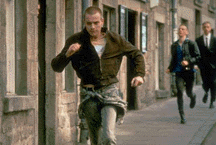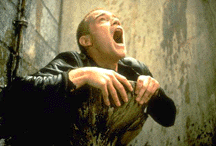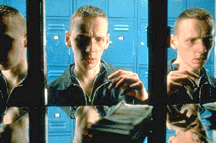Junkies in Training
The young heroin addicts in Danny Boyle's cheerful and cheeky new drug comedy, 'Trainspotting,' just wanna have fun
By Richard von Busack
FOR A CHANGE, Trainspotting is a youth movie that's a good time, full of the beguiling acting, speed and exuberance of early Richard Lester pictures like A Hard Day's Night. The opening shot of antihero Renton (Ewan McGregor) running in high gear from the police comes with a riff I've always wanted to hear in a movie: Tony and Hunt Sales' deathless rhythm-section introduction to Iggy Pop's "Lust for Life."
The whole film takes its cue from the joyous yawp of Iggy's voice, and that same speedy rhythm propels all of Renton's many misadventures. Renton and his mates are heroin addicts, which makes this youth movie a bit more controversial than Help! Trainspotting, which is based on the British bestseller by novelist Irvine Welsh, looks at junkie life in an unself-consciously cheerful way that is as free of hand-wringing as a TV commercial for "Heroin: The choice of a new generation."
One might have moral problems with a heroin commercial--especially since the virtue of heroin is that it isn't advertised. After all, young musicians are overdosing with such rapidity that the mainstream media can't even keep track of the fresh tragedies, much less figure out what the drug says about our failures as a society. In an aesthetic sense, however, a heroin comedy like Trainspotting poses no more of an artistic dilemma than a drunk comedy like Arthur.
What's more important than moral issues, questions of approval and disapproval, and the necessity of warning the youth of today is the simple fact that a cluster of scheming addicts makes for lively fiction. No one knows as many different ways to skin a cat than a junkie. The surprise of Trainspotting is that it has it both ways, without seeming wishy-washy.
Moviemakers have always gotten a sweet fix with junkie movies.
Director Danny Boyle (Shallow Grave) ultimately deplores the habit while giving the junkies credit; they're having a high time in every sense of the word, and they overflow with the full charm of losers. What's also visible here and laughed at is something usually unseen in movies about heroin: that common delusion among junk users that they're the coolest people on the planet.
Renton's voice-over narration plunges us into the breathless action at the beginning. "Choose life. Choose a job. Choose a career. Choose a family," he grouses as we see him running from the cops. He's taken the other path, choosing the needle as a way of consolidating all of life's little debts into one big payment.
The film consists of a series of blackouts and fade-outs, full of such mishaps as the progress of Renton's friend Tommy (Kevin McKidd), who evolves, with the help of needle drugs, from a health fanatic to an invalid so sickly that he's finished off by his own kitten, and Renton's short-lived love affair with underaged Diane (Kelly Macdonald). But the real romance is between the junkie and his junk.
The body of the film traces the arc of Renton's early, unsuccessful attempt to clean up, his overdose and his eventual success at kicking the habit. He actually reforms, after a fashion--he becomes mean and sober.
Although the pace starts to flag right after Renton's withdrawal ordeal, Trainspotting rallies around the sale of a couple of kilos of heroin, a plot maneuver that gives the movie a shot in the arm, so to speak. In these closing sequences, Renton, the dangerous Begbie (Robert Carlyle), the potato-headed Spud (Ewen Bremner) and the slick Sick Boy (Jonny Lee Miller) try to figure out who is going to rip off whom. While friends cutting each other's throats over money also figured prominently in Boyle's last film, the acrid Shallow Grave, Trainspotting is by comparison a cuddly film. Never underestimate the influence of success on a director's temperament.
The film tries to balance the scales between male and female by having Diane tell off Renton on their first meeting, but Diane drops out of sight, as does Allison, an earlier character whose baby falls victim to the most unsentimental baby death in screen history. (This sequence was included in the preview version critics saw a month ago; whether it has been cut for general release, as is rumored on the Internet, remains to be seen.)
The grim punch line to the dead child is Trainspotting's most tough-minded moment. By comparison, there is more sentiment in Renton's almost-lyrical OD, when he's tenderly laid out in the street by his dealer, Swanney (Peter Mullan), to the strains of Lou Reed's ballad "Perfect Day." Indeed, Renton isn't so much a scary figure as he is a parody--a lurking lout who's actually a parent-pecked bundle of nerves. McGregor's performance is as mockingly charismatic a piece of acting as anything since Malcolm McDowell in A Clockwork Orange.
SCREENWRITER John Hodge's inspired adaptation captures the salient anecdotes from Welsh's novel, toning down the more ghastly moments and turning up the sick humor. The notorious opium-suppository-retrieval scene, done with full abscessed horror in the book, becomes something more whimsical onscreen--like pearl diving. Hodge has distilled Welsh's humor and discarded his occasional bouts of self-pity and misplaced attempts to shock.
The movie gets its title from a British hobby of axiomatic dweebiness, in which you stand around Clapham or some equally uninteresting place trying to identify and number the various trains that shuttle past. (In a weak moment in the book, Welsh gives a quick-fix Freudian explanation for Begbie's pathological tendencies by introducing us to the youth's drooling old drunken father in an abandoned railway station.) Trainspotting itself is a metaphor for junkie stasis, for the ability, as recorded by William S. Burroughs, to stare into a shoe for eight hours.
To junkies, though, it's our lives that are boring, not theirs. General Barry McCaffrey, who is President Clinton's drug czar, interviewed in the June 3 New Yorker, quoted more or less uncritically a comment he'd heard that "there are no stupid people doing drugs." Trainspotting suggests a basically naive yet arguable equivalence between being addicted to consumer junk and being hooked on intravenous junk.
A friend who was a heroin addict for a time once murmured to me, "People watch shows like Cops to see what I saw." (Of course, most people like to turn off their TVs sometimes). She was making the equation, commonly heard in the world of drugs, between a vice like TV and a vice like heroin addiction. And, as junkies claim, the selling of heroin is just one more commodity; the drug dealer is buying cheap and selling dear like anyone else.
In an interview, Welsh pointed out that "if you were pedantic, you could say Trainspotting was set in Edinburgh between 1982 and 1988." Let's be pedantic, then, and point out that this span marks the middle of the Margaret Thatcher years, when England was shutting down and selling out many of its social services. Renton, as Welsh did in real life, goes straight from buying drugs to selling real estate.
Trainspotting is wicked fun because even though Renton perhaps gets clear of heroin, it's hardly a moral victory. Still, Trainspotting maintains a moral equilibrium by pointing out that there are worse things than junkies. A fine state of relativism animates the beer-hearted psycho Begbie. Says Renton, "Begbie didn't do drugs, he just did people."
Mr. Potato Head: Beer-hearted junkie Spud (Ewen Bremner) contemplates a big score.
'ON THE ISSUE of drugs, we wir classic liberals, vehemently opposed tae state intervention in any form." Read aloud, the thick lowland Scots dialect of the novel makes more sense. The dialect has been craftily redubbed over the first 10 minutes for the American release in order to avoid losing any potential fans confused by the patois.
On the printed page, Welsh uses a near-impenetrable slang: "gadge" for character, or fellow; "radge" for "ape-like fury"; he also uses variations of the word "fuck" in absolutely floral combinations to describe low-rent life in Edinburgh. Still, if there's one reason to read the novel as well as to see the movie, it's to admire the invective, the stiff upper lip sliced to ribbons by the razor-sharp tongue. Welsh is just one of many writers from outside London beginning to register in England. (A more honorable example is Durham's Pat Barker, the worthy recipient of the Booker Prize in 1995.)
But some of the best satirical writing was already fermenting in the north of Britain, available for $2 American in Viz comics. Viz comes from North England's Newcastle-Upon-Tyne, within shooting distance of Scotland, the English language's last preserve for dialect humor. The comic, like Trainspotting, is sold (sometimes apologetically) on crowd-pleasing "shite jokes." (The extra "e" used in the north of England makes the unprintable word look genteel, like "shoppe" on an antique store.)
Viz is full of the antics of assorted nylon-shirted, soccer-worshipping, premature-ejaculating piss-heads. Sid the Sexist, for instance, is a thickly dialected, opinionated lad whose macho blustering regularly results in punishment.
One wouldn't want to mistake symbols for reality, but based on the comic's popularity in England, it can be presumed that Sid represents a certain species of hopeless Scottish guy as much as Homer Simpson epitomizes an equally hapless American type.
The Scots may be vulnerable as a target for humor because they're divided in loyalties among themselves--Lowland hating Highland, Edinburghers hating "Weegies," or Glaswegians, all united, at least, in the love of Sean Connery, the last person from Edinburgh to have made it big.
(Renton's chum Sick Boy, whose nostrils still flare at the fleeting scent of 007 after-shave, is a constant source of Bond trivia. He even goes with an air gun on a mission to hunt the closest thing to SPECTRE agents Edinburgh has to offer: the pit bulls of local skinheads. Sick Boy, thinking over Dr. No's Ursula Andress, decides that she might be interested in him, in a train of logic worthy of Sid the Sexist. Sick Boy figures he has a chance because of her attentions to Connery: "If she'll shag one punter [jerk] from Edinburgh, she'd shag the fucking lot of us!")
The film, then, doesn't really sell heroin so as much as it appeals, cartoonishly, to anyone's inner adolescent rebelling against everything from work to fresh air and exercise. It is especially likable in the way it observes the slangy, slagging lives of what Welsh calls "dole-moles." In interviews in Britain's film magazine Sight and Sound, director Boyle said that what they were trying to avoid was making a new Ken Loach movie. The filmmakers were looking, in other words, for a less-sorrowful way of observing some of the worst-off people in the U.K.
Comedies like Trainspotting may not give the tragedy of opiate addiction a full serious study, but they are serious in showing that our own foolishness is in treating the addiction as a crime instead of a disease. As Renton demonstrates, if a junkie has to navigate through the worst toilet in Scotland to get his fix, he will.
Renton, mumbling a mantra of the consumer goods he's going to be able to purchase, now that he doesn't have a monkey on his back, is rehabilitated. The ending, however, has the same cynical tartness as Alec the Droog's last line in A Clockwork Orange: "I was cured, all right."
Critics embracing the high spirits of Trainspotting seem to fear the essential glibness of camp-following movies to come and are muted in their praise: the thought of all of the negativity and squalor oozing out of the British Isles gives them pause. But during a summer of nearly unparalleled pandering to the mass audience, Trainspotting's bracing snottiness looks absolutely triumphant.
[ Metro | Metroactive Central | Archives ]
This page was designed and created by the Boulevards team.

Lism Longman


Pearl Diving: Ewan McGregor emerges from the worst toilet in all of Scotland in Danny Boyle's "Trainspotting."
Liam Longman
Trainspotting (Rating; 94 min.), directed by Danny Boyle, written by John Hodge, based on the novel by Irvine Welsh, photographed by Brian Tufano and starring Ewan McGregor, Ewen Bremner and Jonny Lee Miller.
From the August 1-7, 1996 issue of Metro
